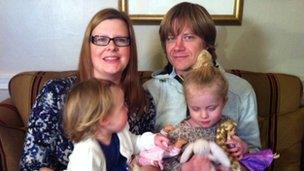Algeria crisis: Scots hostage Kenny Whiteside 'was executed'
- Published
Bob Whiteside on his brother Kenny: "He knew what the game was all about"
The brother of one of the hostages held at an Algerian gas plant says police have confirmed he was executed by his captors.
Kenny Whiteside is originally from Glenrothes in Fife but had lived in South Africa for 30 years.
His brother, Bob, told BBC Scotland the family first learned of his death via the social networking site Facebook.
Meanwhile, a second Scot believed to have been killed has been named locally as Carson Bilsland from Perthshire.
The Scottish government had previously said two workers with Scottish connections were among 48 hostages killed.
A further eight Scots escaped from the four-day siege at the In Amenas facility and are now back in Britain.
Mr Bilsland, originally from Bridge of Cally, near Blairgowrie in Perthshire, was described as an adventure sport enthusiast and former member of the British Speed Skiing team.
John Macpherson, who had worked with Mr Bilsland as a ski instructor at Glenshee, described him as a "very vibrant character" whose loss was a great shock.
Bob Whiteside, who lives in Crieff in Perth and Kinross, said police confirmed his brother's death on Sunday evening. However, the family were already aware of what had happened.
"We actually had to find out for ourselves. We were not given any official information," he said.
"It was on Facebook, of all things, that we actually found out of Kenny's demise. My daughter found a message from an Algerian co-worker.
"The police came last night, and informed us that, basically what was on Facebook was true, that Kenny had been executed."
Escaped hostage Alan Wright: "We're just going to make a run for it"
Mr Whiteside said he held no "grudges" against the Algerian army over the way the hostage situation was handled.
He said: "That's their system, and they weren't bothered about the hostages as such. They just wanted to get the plant clear of all the terrorists.
"That was their main objective as far as I could see."
He said his brother had been working in Algeria for about five years and the safety aspect had never bothered him.
"He's worked all over Africa and all over Russia. He's been around. He knew what the game was all about," he added.
The siege began on 16 January when militants attacked two buses carrying workers to the Algerian plant. They then broke into the facility's living quarters and main installation, seizing hostages.
Desert escape
The Algerian forces began attacking the militants as they tried to move their hostages by car. The siege was finally declared over on Sunday with at least 29 hostage-takers dead and 48 hostages killed.
Alan Wight, 37, of Portsoy, Aberdeenshire, is one of the Scottish hostages who has now returned to the UK.
He told how he managed to escape across the desert after Algerian colleagues cut a hole in a wire fence at the gas plant.
"We just thought, we have to go now. We walked very quickly into the desert, not even looking back," he said.

Alan Wright returned to his home in Aberdeenshire on Saturday
Mr Wright told the BBC that he and other colleagues hid in a locked office with the windows taped when they heard from a colleague that what they thought was a routine shutdown was actually a terrorist attack.
"We were actually very, very calm at first. We knew what to do, which was get ourselves out of the way and keep low and stay out of sight," he said.
The BP employee said they could hear gunfire outside and at one point someone came into the building where they were hiding.
"They said 'good morning' in a very friendly voice. We think that was the terrorists coming to try and get people out."
He added: "Night time was particularly bad because you were just waiting for the door to be kicked in and to be taken away."
Liaising closely
Scotland's Justice Secretary Kenny MacAskill has said he believes no-one could have anticipated the "horrendous attack" at the gas plant.
He said there had always been "difficulties" in Algeria but no-one could have foreseen what happened.
Speaking to BBC Radio Scotland's Good Morning Scotland programme, he praised the Foreign and Commonwealth Office (FoC) for liaising closely with Scottish officials.
Mr MacAskill said it was not the right time to comment on how the Algerian authorities had handled the crisis.
He added: "We need to review the situation and clearly any action that has to be taken should be taken on an international basis."